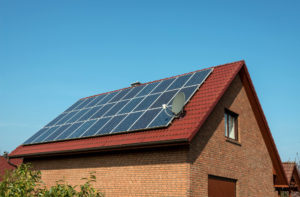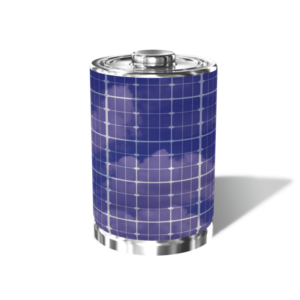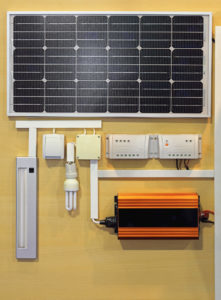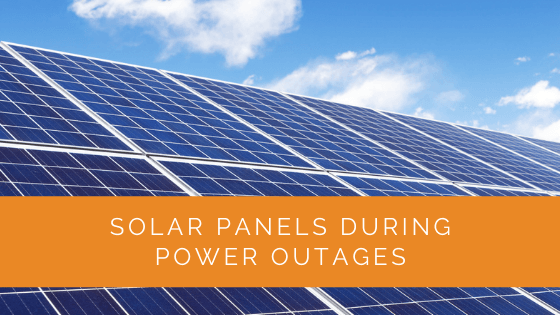The US faces more power outages due to weather, infrastructure failures, and increased demand. Solar energy provides a sustainable solution, but most solar panels are grid-tied and won’t work during blackouts without additional components. This article explains how solar panels can be used during outages and the role of solar batteries in ensuring continuous power supply. Understanding these aspects can help you make informed decisions to maintain power during outages..
Contents
- 1 Key Takeaways
- 2 What is the Difference Between a Grid-Tied System and an Off-Grid System?
- 3 How Can Solar Panels Be Used During Power Outages?
- 4 How Do Solar Batteries Work?
- 5 Pros and Cons of Using a Solar Battery Storage
- 6 What Is a Solar Generator?
- 7 What is a Solar Inverter?
- 8 Case Study: Ensuring Power Reliability with Solar Panels During Outages
- 9 Expert Insights From Our Solar Panel Installers About Solar Panels During Power Outages
- 10 Experience Solar Excellence with Us!
- 11 Bottom Line
Key Takeaways
- Solar panels and solar energy storage offer a valuable backup power source during power outages in the USA, making the environment more sustainable.
- Solar systems can function in two ways during outages: with an off-grid system for complete energy independence or a battery-backed system for a more cost-efficient option.
- Solar battery storage’s pros include eco-friendliness and portability, while its cons include limited power generation, high cost, and maintenance requirements. Solar generators and inverters are alternative options for backup power.
What is the Difference Between a Grid-Tied System and an Off-Grid System?
When it comes to electricity distribution, your utility helps in generating electricity through the electric grid. A grid-tied system ensures that you will be connected to the grid throughout.
Even when your system is not generating energy, the grid-tied solar systems help you draw power from your utility grid. Through metering, your utility sends excess electricity to the grid for credit.
Now, we come to an off-grid system – this power system, as the name suggests, is not connected to the grid. This gives you complete energy independence. What happens in this system is that you will only have access to the electricity generated by your system and stored in the solar batteries.
What’s better in this system is that you’ll still have access to power even if the grid goes down.
With a grid-tied solar power system, you won’t get electricity in case of a power outage since excess energy is stored in the grid. If you choose to go for an off-grid solar power system, you can access electricity stored in the solar battery.
Knowing the grid power system is essential in understanding how solar power functions during power outages.

How Can Solar Panels Be Used During Power Outages?
Having excess solar energy stored can benefit you during power outages, as you can utilize energy from that storage source.
Solar panels can be used in two ways during a power outage, either by installing an off-grid solar system or solar-powered battery storage. Let’s look at how both these options help you restore electricity during a power outage.
Installing an Off-Grid Solar System
Most solar energy systems with an off-grid solar system require an adequate number of battery storage to ensure that you can access electricity stored in these batteries in times of an outage.
This makes an off-grid solar system much costlier than a grid-tied system, which is why it is not considered a viable investment for homes and businesses. In this system, you also do not have the option to draw excess electricity from the grid if your solar system is not producing enough energy.
One significant advantage of this solar system is complete energy independence. So, every time your grid goes down, you can utilize your solar system. An off-grid solar system is great for remote locations, like a remote cabin.
Installing a Battery-Backed Solar System
If you’re looking for a more cost-efficient and effective option, installing a battery-backup solar system is the right option. This solar system will be less expensive than a grid-tied system, as the required number of solar batteries will be less.
If you install one or more solar batteries, you can store unused or excess power produced by your solar system. If the electricity grid goes down, you can quickly draw that power without causing any extra load on your utility.
However, it’s important to keep battery backup power storage limitations. Despite solar batteries becoming common among many people in the U.S., it’s still an expensive investment.
Along with the installation, one 9.8kWh solar battery can cost you around $15,000. This can increase the overall cost of your solar system.

How Do Solar Batteries Work?
Since power outages in the U.S. are increasingly alarming, shifting to a more sustainable energy consumption source is necessary. A solar battery is one such option that provides you with previously generated electricity even when the grid goes down.
Installing a solar system with battery storage ensures that your power remains on by disconnecting itself from the grid in times of an outage, unlike a typical grid-tied system.
When there is a blackout, your utility system charges your solar batteries during the day with sunlight and discharges them at night.
Pros and Cons of Using a Solar Battery Storage
Like every good and bad side of a coin, technology has its pros and cons. It’s crucial to consider these before deciding on a battery backup system.
Solar panels work with the help of sun rays, and they help you generate the electricity needed for your everyday functions.
Solar battery storage provides power to your household or business even when there is a power outage. These storages have enough battery capacity to ensure that you can continue your work during a power outage.
You can go through this list of the pros and cons to consider before installing solar battery storage.
Pros
- Eco-friendly: Solar battery storage is an eco-friendly and sustainable option, as it runs entirely on the sun’s rays and discharges by itself at night.
- Portable to Use: The whole solar battery system is portable to use, and you can reinstall it anywhere without worrying about its mobility.
- A Good Investment: Most solar panel systems are a long-term investment, so purchasing and investing in good-quality battery backup power is going to last you a long time.
Cons
- Limited Power Generation: The size of the power system determines the amount of power generation. So, if you have a smaller power system, your utility system won’t produce enough energy.
- Expensive: Solar battery powers are not cheap; they’re expensive, and this storage system is usually more costly than a grid-tied solar system.
- High-maintenance: The maintenance cost of these battery backup systems can be high, and taking care of them requires excess care and management. It does, however, ensure long-lasting battery life.
What Is a Solar Generator?
A solar generator is one of the most feasible renewable energy sources. This option is suitable if you don’t wish to invest in expensive solar battery backup storage.
These solar generators will help you with the least, like keeping your food cold and your space heater running.
Solar generators can be charged with or without solar panels and are completely portable. However, these generators don’t charge when the grid is down.
A similar solar battery storage system is required to charge these generators in a power outage.

What is a Solar Inverter?
Many people widely prefer solar inverters as they automatically disconnect in an outage but still provide power to your house with the help of your solar panels.
A solar inverter uses the energy from the panels without making a connection to the grid or any external backup generator or storage.
You can invest in solar inverters as they’re more feasible than battery storage.
Case Study: Ensuring Power Reliability with Solar Panels During Outages
Background
A client living in a suburban area prone to frequent power outages approached Solar Panels Network USA seeking a reliable solution to maintain electricity during these disruptions. The client had a grid-tied solar system installed but was frustrated by the lack of power during outages. Our goal was to provide a sustainable solution that ensured continuous power supply.
Project Overview
The project involved assessing the client’s current solar setup and recommending a suitable backup system. We considered both off-grid systems and battery-backed solutions, evaluating their feasibility, cost, and effectiveness for the client’s needs.
Implementation
Initial Assessment and Requirements Analysis
We began by evaluating the client’s existing grid-tied solar system, including its capacity and efficiency. The client’s energy consumption patterns were analyzed to estimate the required battery storage capacity. Additionally, the frequency and duration of power outages in the area were considered to determine the most suitable backup solution.
Recommendation and Solution
After a thorough analysis, we recommended installing a battery-backed solar system. This solution provided a balance between cost and functionality, offering reliability without the higher costs associated with a full off-grid system. We selected a high-capacity lithium-ion battery known for its efficiency and longevity.
Installation Process
The installation involved integrating the new battery system with the existing solar setup. Our team of certified technicians ensured a seamless transition, setting up the system to automatically switch to battery power during outages. The installation included configuring the Battery Management System (BMS) to optimize battery usage and longevity.
Results
The new battery-backed solar system provided the client with a reliable power source during outages. The system was tested extensively to ensure it met the client’s energy needs during blackouts. The client reported a significant improvement in their quality of life, with uninterrupted power supply even during extended outages.
Summary
At Solar Panels Network USA, we strive to provide tailored solutions that meet our clients’ unique needs. This case study highlights the importance of having a backup system for grid-tied solar panels, especially in areas with frequent power outages. By choosing a battery-backed system, the client achieved a reliable and sustainable power solution that enhanced their energy independence. Our expertise in solar technology ensures that we deliver effective and efficient energy solutions, supporting our clients in their journey towards sustainability.
Expert Insights From Our Solar Panel Installers About Solar Panels During Power Outages
Many people believe that solar panels alone can provide power during outages, but without a battery storage system or an off-grid setup, this isn’t the case. Battery-backed systems are essential for ensuring continuous power supply during blackouts.
Solar Energy Consultant
Off-grid solar systems offer complete energy independence, making them an excellent choice for remote locations or areas with frequent power outages. However, the cost can be a significant factor, so it’s important to weigh the benefits against the investment.
Lead Solar Technician
Solar inverters are a practical alternative to battery storage systems. They disconnect from the grid during an outage but can still use solar panels to provide power directly to your home, ensuring you have electricity when you need it most.
Senior Solar Installer
Experience Solar Excellence with Us!
Trust in Solar Panels Network USA, where our seasoned experts deliver top-quality solar solutions for homes and businesses nationwide. With a legacy of countless successful installations and a commitment to sustainable energy, we’re your reliable partner in the solar journey. Ready for a brighter, eco-friendly future? Call us now at (855) 427-0058 and harness the power of the sun!
Bottom Line
Power outages have become a common thing in the USA, and they frequently occur, coming in the way of everyday functions. Frequent power outages can cause damage to the electricity grid.
Solar panels produce effective and efficient energy using renewable energy sources, helping the environment become more sustainable and eco-friendly.
The growing use of solar panels and solar-powered battery storage systems is a step towards a greener environment that produces energy effectively.
If you’re looking forward to installing a solar panel system in your household, consider going through the many factors before installing one.
Cost, maintenance, weather, and climatic conditions play significant roles in determining the effectiveness of these systems.
About the Author
Solar Panels Network USA stands at the forefront of solar energy solutions, driven by a team of seasoned solar engineers and energy consultants. With over decades of experience in delivering high-quality solar installations and maintenance, we are committed to promoting sustainable energy through customer-centric, tailored solutions. Our articles reflect this commitment, crafted collaboratively by experts to provide accurate, up-to-date insights into solar technology, ensuring our readers are well-informed and empowered in their solar energy decisions.

